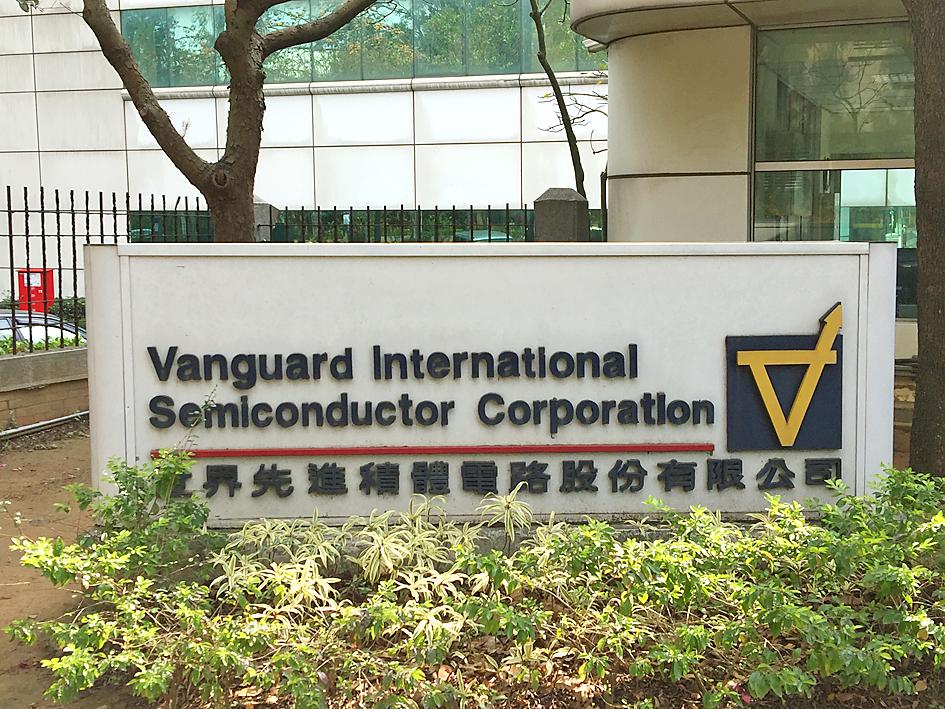Contract chipmaker Vanguard International Semiconductor Corp (世界先進) yesterday said that it plans to allocate 41.2 percent more capital expenditure to expand capacity this year as demand has greatly surpassed its capacity amid a stay-at-home trend.
The Hsinchu-based chipmaker plans to spend NT$5 billion (US$176.14 million) on new facilities and equipment to mitigate the supply crunch, up from NT$3.54 billion last year.
Based on its expenditure plan, the chipmaker’s most-requested 0.18-micron and 0.25-micron technology capacity would increase by a combined 20 percent from last year, Vanguard said.

Photo: Grace Hung, Taipei Times
Part of the spending would be to expand automotive chips, which make up less than 10 percent of its total shipments, Vanguard said.
“Demand for semiconductors is very strong this year,” Vanguard chairman Fang Leuh (方略) told investors at a teleconference. “The demand momentum is to last for two to three quarters at least before taking a pause.”
Some customers have booked orders for third-quarter shipments, Fang said.
Vanguard said that it has clear order visibility and expects factory utilization rate to remain “quite high” in the first half of this year, thanks to rising demand.
The equipment loading rate has risen to 100 percent from 95 percent last quarter, it said.
Vanguard is exploring ways to expand its 8-inch wafer capacity, including via acquisitions, as it is unable to fully satisfy demand, it said.
The company in 2019 purchased an 8-inch fab from GlobalFoundries Inc for US$236 million.
For this year, Vanguard expects shipments of power management ICs to outgrow flat-panel driver ICs.
It expects a double-digit percent annual growth rate for its power management ICs, which contributed 56 percent to the company’s revenue last quarter, Vanguard said.
As chip supply tightens, Vanguard has hiked prices for new orders by about 5 percent this quarter, due to higher manufacturing costs, it said.
Revenue is to climb to a new high of NT$8.9 billion to NT$9.3 billion this quarter, which would be quarterly growth of 2.06 to 6.76 percent from NT$8.72 billion last quarter, it said.
Gross margin is to remain between 36.5 and 38.5 percent this quarter, compared with 37.4 percent last quarter, it said.
The company’s goal is to lift its gross margin to 40 percent, Vanguard said, without providing a timeframe.
Net profit last quarter jumped 21.6 percent to NT$1.82 billion, compared with NT$1.5 billion in the same period of 2019.
Last year as a whole, net profit rose 7.6 percent to NT$6.31 billion from NT$5.87 billion in 2019, or earnings per share of NT$3.81, up from NT$3.54 a year earlier.
The firm’s board of directors on Monday approved a cash dividend distribution of NT$3.5 per common share, representing a payout ratio of 92 percent.

TECH TITAN: Pandemic-era demand for semiconductors turbocharged the nation’s GDP per capita to surpass South Korea’s, but it still remains half that of Singapore Taiwan is set to surpass South Korea this year in terms of wealth for the first time in more than two decades, marking a shift in Asia’s economic ranks made possible by the ascent of Taiwan Semiconductor Manufacturing Co (TSMC, 台積電). According to the latest forecasts released on Thursday by the central bank, Taiwan’s GDP is expected to expand 4.55 percent this year, a further upward revision from the 4.45 percent estimate made by the statistics bureau last month. The growth trajectory puts Taiwan on track to exceed South Korea’s GDP per capita — a key measure of living standards — a

Samsung Electronics Co shares jumped 4.47 percent yesterday after reports it has won approval from Nvidia Corp for the use of advanced high-bandwidth memory (HBM) chips, which marks a breakthrough for the South Korean technology leader. The stock closed at 83,500 won in Seoul, the highest since July 31 last year. Yesterday’s gain comes after local media, including the Korea Economic Daily, reported that Samsung’s 12-layer HBM3E product recently passed Nvidia’s qualification tests. That clears the components for use in the artificial intelligence (AI) accelerators essential to the training of AI models from ChatGPT to DeepSeek (深度求索), and finally allows Samsung

READY TO HELP: Should TSMC require assistance, the government would fully cooperate in helping to speed up the establishment of the Chiayi plant, an official said Taiwan Semiconductor Manufacturing Co (TSMC, 台積電) yesterday said its investment plans in Taiwan are “unchanged” amid speculation that the chipmaker might have suspended construction work on its second chip packaging plant in Chiayi County and plans to move equipment arranged for the plant to the US. The Chinese-language Economic Daily News reported earlier yesterday that TSMC had halted the construction of the chip packaging plant, which was scheduled to be completed next year and begin mass production in 2028. TSMC did not directly address whether construction of the plant had halted, but said its investment plans in Taiwan remain “unchanged.” The chipmaker started

MORTGAGE WORRIES: About 34% of respondents to a survey said they would approach multiple lenders to pay for a home, while 29.2% said they would ask family for help New housing projects in Taiwan’s six special municipalities, as well as Hsinchu city and county, are projected to total NT$710.65 billion (US$23.61 billion) in the upcoming fall sales season, a record 30 percent decrease from a year earlier, as tighter mortgage rules prompt developers to pull back, property listing platform 591.com (591新建案) said yesterday. The number of projects has also fallen to 312, a more than 20 percent decrease year-on-year, underscoring weakening sentiment and momentum amid lingering policy and financing headwinds. New Taipei City and Taoyuan bucked the downturn in project value, while Taipei, Hsinchu city and county, Taichung, Tainan and Kaohsiung